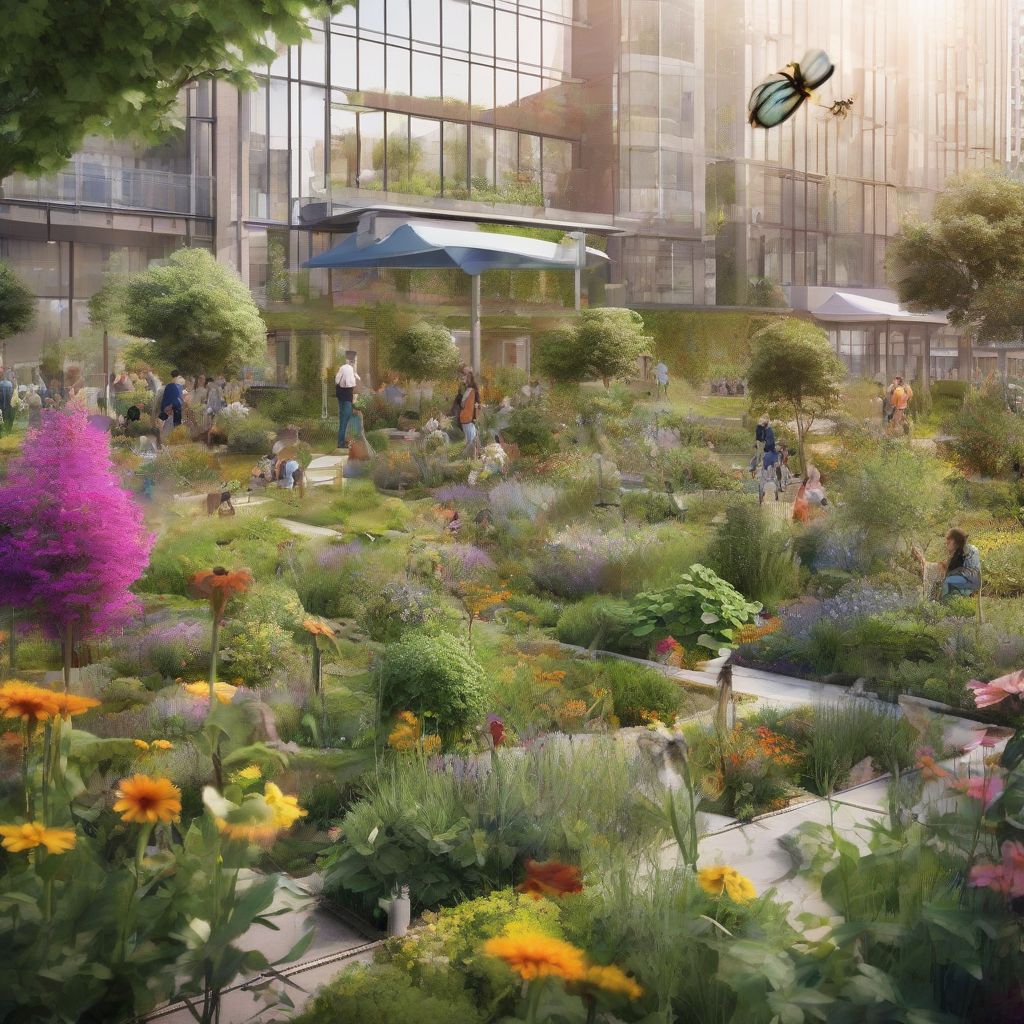Imagine stepping out your back door into a lush, green paradise. Butterflies dance among herbs, tomatoes ripen on the vine, and the air hums with the gentle buzz of bees. Now, picture this oasis nestled amidst the concrete jungle of a bustling city. This is the magic of urban gardening, a movement transforming not only rooftops and balconies but also the very fabric of our urban ecosystems.
As a nutritionist and meal prepping coach, I’m passionate about the power of fresh, wholesome food. But urban gardening goes beyond our plates; it’s a powerful tool for nurturing the health of our cities and the environment. So, let’s dig deeper into the fascinating impact of urban gardening on local ecosystems.
A Breath of Fresh Air: How Urban Gardens Benefit the Environment
City life often feels removed from nature, but urban gardens bridge that gap, acting as mini-ecosystems teeming with life. Here’s how:
1. Purifying the Air We Breathe
Cities are notorious for their air pollution, but urban gardens act as natural air filters. Plants absorb carbon dioxide and release oxygen, improving air quality and combating the urban heat island effect.
2. Conserving Water and Protecting Our Waterways
Urban gardens can be designed with water conservation in mind. Techniques like rainwater harvesting and drip irrigation reduce reliance on municipal water supplies and minimize runoff, protecting our rivers and lakes from pollution.
3. Enhancing Biodiversity: A Haven for Wildlife
Concrete landscapes offer little refuge for wildlife, but urban gardens provide essential habitats for pollinators like bees and butterflies, along with birds and beneficial insects. This biodiversity is crucial for a healthy ecosystem.
 Urban Garden Biodiversity
Urban Garden Biodiversity
From Concrete to Compost: The Social and Economic Impact of Urban Gardening
The benefits of urban gardening extend far beyond the environment, fostering vibrant communities and boosting local economies.
1. Building Community and Food Security
Urban gardens often become social hubs, bringing people together to grow food, share knowledge, and build stronger communities. They also increase access to fresh, healthy food, particularly in underserved neighborhoods.
2. Educational Opportunities and Green Skills
Urban gardens serve as living classrooms, educating people of all ages about nature, sustainable living, and the importance of local food systems. These skills empower individuals to become stewards of their environment.
3. Economic Benefits and Urban Revitalization
Urban gardens can create economic opportunities through farmers markets, community supported agriculture (CSA) programs, and even green jobs in garden design, maintenance, and education. They also enhance property values and contribute to urban revitalization efforts.
Cultivating a Greener Future: The Challenges and Opportunities of Urban Gardening
While the benefits of urban gardening are undeniable, there are also challenges to consider:
1. Space Limitations and Urban Design
Finding space for gardens in densely populated areas can be challenging. Creative solutions like rooftop gardens, vertical gardening, and community plots can help overcome this hurdle.
2. Soil Contamination and Urban Pollution
Urban soils may contain contaminants, requiring testing and remediation. Choosing plants that tolerate urban conditions and using raised beds with clean soil are effective strategies.
3. Access and Equity in Urban Gardening
Ensuring equitable access to urban gardening opportunities for all residents, regardless of income, background, or neighborhood, is crucial. Community-based initiatives and partnerships can help bridge this gap.
Sowing the Seeds of Change: Tips for Eco-Friendly Urban Gardening
Ready to get your hands dirty and create your own urban oasis? Here are some tips for eco-friendly gardening:
- Choose native plants: They thrive in local conditions and support native wildlife.
- Compost kitchen scraps: This reduces waste and creates nutrient-rich soil.
- Avoid chemical pesticides and fertilizers: Opt for natural alternatives like compost tea and companion planting.
- Conserve water: Use rain barrels, drip irrigation, and mulch to minimize water usage.
- Support local pollinators: Plant pollinator-friendly flowers and provide water sources.
Growing Together: The Future of Urban Gardening
Urban gardening is more than a trend; it’s a movement transforming our cities into healthier, more sustainable, and vibrant places to live. By embracing the power of nature in our urban landscapes, we can create a greener, more resilient future for generations to come.
So, whether you have a sprawling backyard, a sunny balcony, or just a windowsill, consider joining the urban gardening movement. Every seed planted, every flower bloomed, and every vegetable harvested contributes to a healthier planet and a brighter future for us all.
[amazon bestseller=”urban gardening”]
